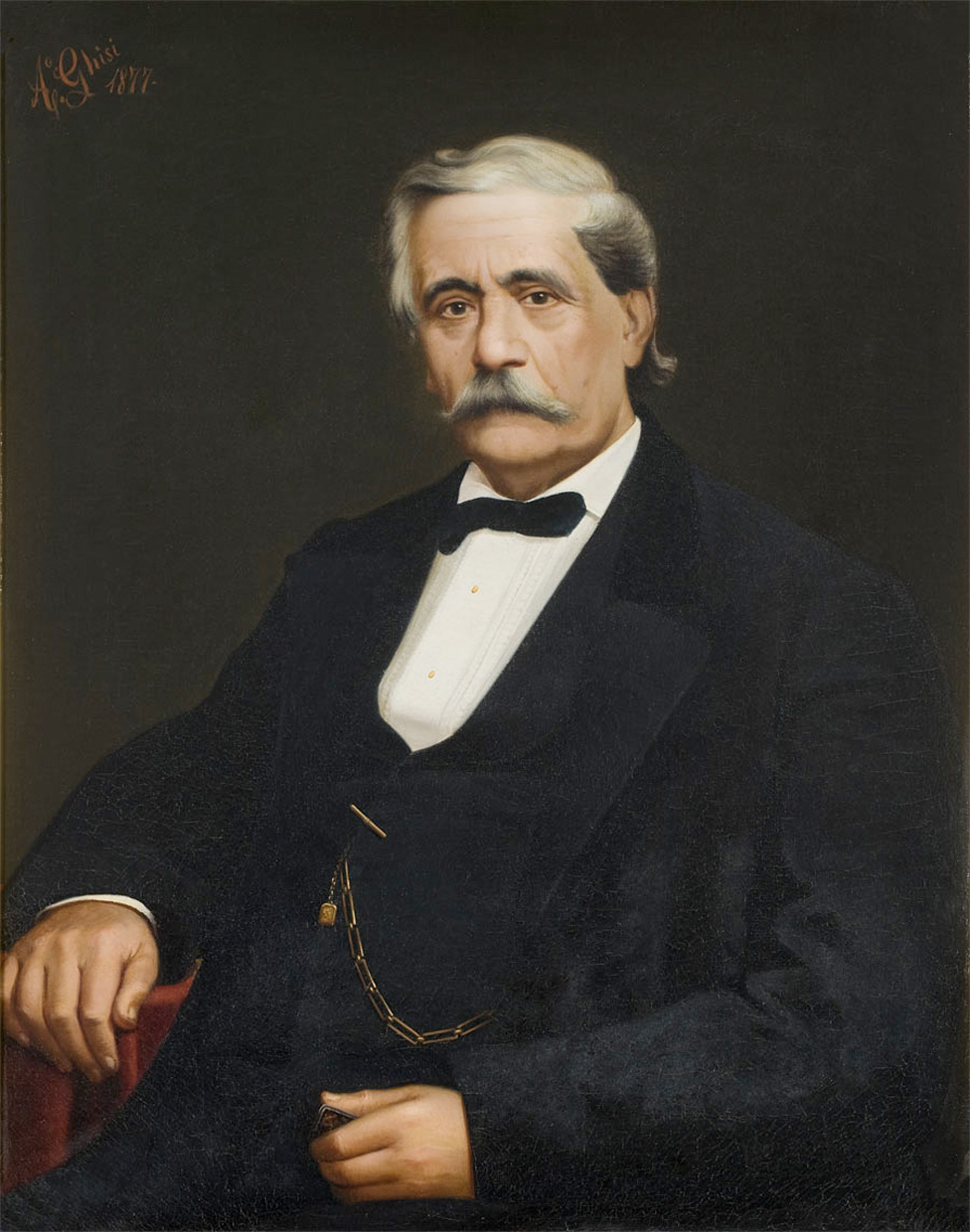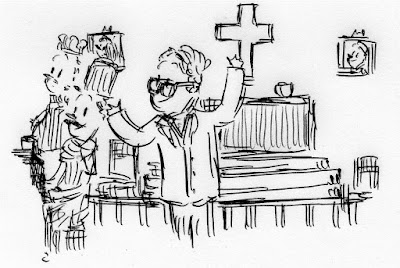Giuseppe Verdi is probably the most important composer in Italian opera of all time. He had a very long career, having wrote his first opera in 1839 (
Oberto, Conte di San Bonifacio) and his last,
Falstaff, in 1893. During all those years, Verdi was the main figure in Italian musical culture and this was both a lucky thing, because Italian audiences could listen to some of the most wonderful operas in the history of music, and a problem, because no other composer could achieve a long-term success during Verdi's "reign".
Well, in this post I want to tell you about his life: let's discover together the wonderful life of Giuseppe Verdi.
Verdi was born in 1813, the same year as Wagner. He was born in a small village in Northern Italy, Le Roncole, in a very important moment in World history: the Russians had defeated Napoleon in Russia and were now running after the French army in Italy. They arrived in Le Roncole as well, a few time after Verdi's birth and destroyed everything (war hasn't changed since then, as we can see) and Verdi's mother saved the newborn child by hiding him in the local church.
 |
| A young Verdi with his mother and his father short after his birth in 1813; the house you can see behind them is the actual Verdi's birthplace. The house is still in Le Roncole (nowadays the village is called Roncole Verdi) and you can visit it. For more information, you can see this website. |
|
Verdi then grew and discovered music: he learnt to play organ in the church and probably listened to the brass bands which were so popular in Italy in those years and which still today are in some parts of the country. This is very important because we can see that, when he began to write operas, Verdi gave a great importance to brass and wind instruments, as if he were trying to recreate the sound of the brass bands he'd listened to during his youth.
Do you know Cinderella's tale, where a beautiful but poor young lady manages to marry a prince thanks to a gentle fairy? Well, Verdi's life has many in common with that tale, even if his parents were certainly not poor; Verdi tried to say they were "illiterate peasants" after he had reached success in order to show himself as a humble-origins-but-hard-worker self made man but we know for sure they weren't, they were small landowners and surely had enough money to lead a comfortable life. Nevertheless, the young Giuseppe could not have become the composer all Italy knew about if he hadn't met his Cinderella's fairy, Antonio Barezzi.
 |
| Antonio Barezzi |
Antonio Barezzi was the richest man in Busseto, a small village near Le Roncole, and a music lover: he played flute and had founded in 1813 a Philarmonic Society in his village. Barezzi decided to give Verdi the opportunity to become a professional musician and sent him in Milan, paying his studies in there.
Verdi married Barezzi's daughter (I know that may seem an unimportant fact, but please remember it, it will be useful later) and went to Milan.
 |
In 1836, Verdi married Margherita Barezzi, Antonio's daughter
|
|
In the 1830s, when Verdi arrived in Milan, Italy had two musical capitals. The first was in the South and was Naples, with its wonderful San Carlo Theatre where Rossini had premiered his most experimental operas in the 1810s and where now Donizetti had much success. The second was in the North and was Milan, with its Teatro Alla Scala which had been opened the 3rd of August 1778 with the premiere of
L'Europa riconosciuta by Antonio Salieri. Yes,
that Salieri, the guy who
Amadeus shows as Mozart's rival in Vienna. Well, I'll tell you a secret: Salieri
was not Mozart's rival and also helped him to get some work in Vienna, since they were both Freemasons. I hope I'll manage to talk about that in another post, now let's move on.
Milan could seem an inhospital city. My former double bass teacher lived there for a while and described it as cold, sad and foggy in the winter; Verdi could have said probably the same, since his beginnings in Milan weren't easy. He applied to attend the local Conservatoire, but his application was rejected. Then, he discovered the interesting side of 1830s Milan, which was its cultural life. Music was everywhere and all the most important Italian operas of the time were premeried or performed in one of the many theatres there were in the city. In Milan many operas by Bellini and Donizetti (the leading composers of the time) were represented and Verdi went and watched them.
 |
| Milan Conservatoire. Verdi applied to study piano in there but he was rejected. Later, after he had become famous, the Conservatoire wanted to change its name in "Giuseppe Verdi Conservatoire" in Verdi's honour, but Verdi refused by saying: "They rejected me when I was young, they won't have me now." Ironically, after Verdi's death the Conservatoire managed to change its name and today it is called "Conservatorio Giuseppe Verdi" |
He was interested, in particular, by Donizetti's Lucia di Lammermoor and some authors think that, when he wrote Il Trovatore in 1853, he wanted to try to reproduce the atmosphere of that opera.
During his stay in Milan, Verdi finally achieved what every composer wanted: he was charged to write an opera. His first opera was called
Oberto, Conte di San Bonifacio and was premiered in the Teatro Alla Scala in 1839. It had some success and it probably seemed the beginning of Verdi's career as a successful composer. It wasn't: Verdi's second opera,
Un giorno di regno, was a fiasco. Some critics think the problem was not Verdi's music, but Felice Romani's libretto to the opera. Felice Romani was a very important librettist, at the time: he had written librettoes to the most important operas by Bellini and to some operas by Donizetti. His collaboration with Bellini, in particular, is worth to be remembered because it lead to the composition of
La Sonnambula and
Norma. But Verdi wasn't as famous as Bellini and Romani hadn't much time to write a libretto for him, so he gave him a libretto he had written a long time before and which was not so good. The result was the failure of the opera.
 |
Verdi's first opera was Oberto, Conte di San Bonifacio in 1839
|
|
What's more, Verdi hadn't luck in his personal life as well. Do you remember Barezzi's daughter, Margherita? Do you remember she had married Verdi, don't you? Well, in 1840 she died. Verdi and Margherita had two children, Virginia and Icilio. Well, between 1839 and 1840 they both died as well.
Verdi felt despair. He was alone in Milan with no wife, no children, no further opportunities to write an opera. Everything had gone too bad for him, so he went back to Busseto and promised he would have never write any opera in the future.
 |
Verdi going back to Busseto
|
|
Luckily, he then changed his mind, but we'll talk about this in the next episode.
See you soon!
Links:
The house were Verdi was born in Le Roncole is today a museum. You can find its website here (in English)










Nessun commento:
Posta un commento